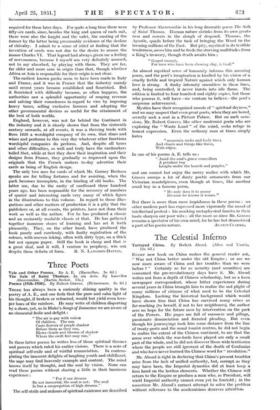Three Poets
Vale and Other Poems. By A. E. (Macmillan. 3s. 6d.)
The Sale of Saint Thomas. In six Acts. By Lascelles Abercrombie. (Martin Seeker. 15s.)
Poems (1926-1930). By Robert Graves. (Heinemann. 3s. 6d.) THERE has always been a curiously shining quality in the poetry of A. E., and one feels that the pure and calm light of his thought, if broken or refracted, would but yield even love- lier hues of the rainbow. He may write of children disporting by a shore, yet, as in Blake's Songs of Innocence we are aware of an elemental frolic and delight : " The air is gay with voices
Of children. The sun Casts flowers of purple shadov0 Before them as they run, Blows clouds and blooms of shado* Where the swift feet may run."
In these latter poems he writes less of those spiritual thrones and powers which ruled his earlier visions. There is a note of spiritual self-exile and of wistful renunciation. In contem- plating the innocent delights of laughing youth and childhood, the sage may find heavenly example and content. The mind knows itself by thought, and the soul by vision. None can read these poems without sharing a little in their luminous
experience :
" For if our dreams Be not immortal, the soul is not. The soul Is but a congregation of high dreams."
The self-strife and ardours of spiritual existence are described by Professor Abercrombie in his long dramatic poem The Sale of Saint Thomas. Human nature shrinks from its own great.
ness and cowers in the slough of despond. Thomas, the Apostle, quails before the task of bringing the Word to the teeming millions of the East. But pity, mystical in its terrible tenderness, saves him and he feeds the starving multitudes from a King's treasury, though death awaits him :
" Gospel enough, For men who have been chewing clay, is food."
An almost mystical sense of humanity informs this amazing poem, and the poet's imagination is kindled by his vision of a cruelly fertile and tropical Nature against which only human love is strong. A dusky intensity smoulders in these lines, and, being controlled, it never bursts into idle flame. The edition is limited to four hundred and eighty copies, but those who possess it, will have—we venture to believe—the poet's surpreme achievement.
Mystics have their recognized moods of " spiritual dryness," and we may suspect that even great poets, when they are bored, secretly seek a seat in a Picture Palace. But on such occa- sions, Mr. Robert Graves, like other modernist poets who are exploring the " Waste Land " of the mind, seeks refuge in honest expression. Even the ordinary man at times simply hates
" mountain rocks and leafy trees And clouds and things like these, With edges.
In one of his poems A. E. tells us :
" Amid the soul's grave councillors
A petulant boy Laughs under the laurels and purples,"
and one cannot but enjoy the merry malice with which Mr. Graves sweeps a lot of dusty poetic ornaments from our Victorian mantelpieces, even though at times, like another small boy in a famous poem,
" He only does it to annoy Because he knows it teases."
But there is more than mere impishness in these poems : no other modern poet has expressed more vigorously the mood of intellectual protest : his mocking metaphysical fancies in their haste sharpen our poor wits : all the more so since Mr. Graves remains a spectator of his own mind, for he has but dramatized






































 Previous page
Previous page